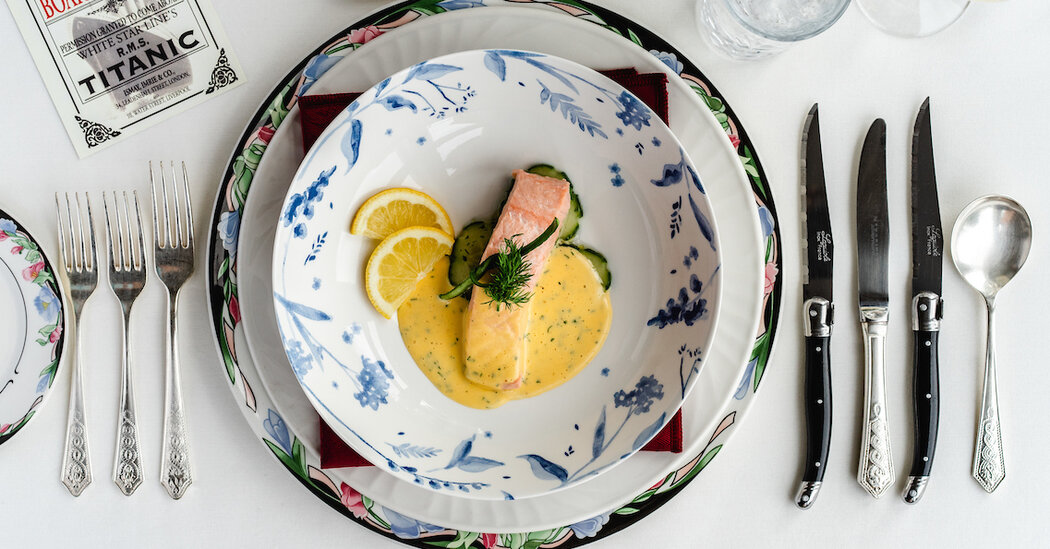
Coinciding with the anniversary of the Titanic sinking, on April 15, 1912, there will be a two-part virtual talk from the 92nd Street Y covering the ways of not just top-hatted and bejeweled first class passengers like the Astors and Guggenheims, but also the less fortunate huddled in steerage, and even the crew. Veronica Hinke, the author of “The Last Night on the Titanic: Unsinkable Drinking, Dining and Style,” to be published in paperback next week, will provide the details. As in the book, she plans to cover the demands of style that defined luxury in the late Edwardian era, the games the passengers played on board, menus from the ship with recipes for some dishes, like English pea soufflé and apple meringue, and the pre-Prohibition drinks that were served in first class. Included will be what people down in third class ate and drank. She will also describe life on board as recounted by survivors and family members of those who sailed.
“Drinking, Dining and Style Aboard the Titanic,” online April 14 and 21 at 2 p.m., $80, Roundtable by the 92nd Street Y, New York, roundtable.org.
Swimming Pink Scallops Straight From Alaska
Bay scallops from Alaska are newcomers for E-Fish, a fresh seafood delivery company. Called swimming pink scallops, they come from icy waters off Sitka, on the Alaskan panhandle, by way of one fisherman who has a permit from the state to harvest them. They are expected to be available until the end of May, and are sold in the shell — they gape a bit, and that’s normal — with the mantle and coral intact. The scallops are best prepared by first letting them soak in cold water for abut 30 minutes, so they expel any grit. Then they can be steamed like clams in the shell, or baked on the half shell. The mantle surrounding the white adductor muscle, the actual “scallop,” can be a trifle rubbery; it can be easily removed after a brief steaming, leaving the nugget of meat to be baked in the shell with a topping, used in ceviche or tossed in pasta sauce.
Live swimming pink scallops, four pounds (about 80) for $129, E-fish.com.
The Egg, From Shell to Yolk
At a time of year when eggs figure importantly in holiday dishes and as symbols of seasonal rebirth, there’s now a way to get to know them better. A new book of essays, “Egg: A Dozen Ovatures,” by the writer Lizzie Stark, covers just about every aspect of the egg: biology, symbolism, health, medicine, art, culture, cultivation and, of course, cookery, with advice from the chef Jacques Pépin. Eggs were sent into space to study the effects, and have been buried in the ground to guarantee a harvest. Even the practical uses of eggshells are described in the book’s lively pages.
“Egg: A Dozen Ovatures” by Lizzie Stark (W.W. Norton $28).
Matisse Motifs to Decorate a Drink
Add a touch of whimsical elegance to your spring or summer table with these new tumblers inspired by the artist Henri Matisse’s cutout patterns. Designed by Alessandra Baldereschi for Sprezz, a new tabletop company, each holds nearly 10 ounces and comes in a choice of colors: amber, lilac, blue or pink, in sets of four, all one tone or a mix. The glasses are dishwasher-safe but with the design sprouting in the middle of each you might want to use small ice cubes or none at all.
Sprezz Whimiscal Collection tumblers, $100 for four, sprezznyc.com.
Flour That Stems From Upcycling
“Upcycling” is coming to a restaurant and grocery near you. The term refers to using waste material that is usually discarded. Supplant, an innovative company based in Cambridge, England, has developed flour that is milled not just from the seeds of wheat stalks but from the stalks, or “straw,” that is usually left after harvest. Tom Simmons, the plant scientist who founded the company, previously developed a sugar made from corncobs, which the chef Thomas Keller uses in chocolate bars. Mr. Keller has also used Supplant Grain and Stalk Flour, which he says behaves like all-purpose flour, in three kinds of fresh pasta and a dessert, along with other items on his menus. In addition to reducing waste, the new flour has nutritional advantages, like a higher fiber content, over all-purpose flour. For now, the flour, which is being made in the Midwest, is available only to commercial food service, but the company is selling rigatoni made from the flour on its website. It’s everyday pasta, but has 12 grams of fiber in two ounces dried and 140 calories, compared with about the typical two grams of fiber and 200 calories.
Supplant Pasta, $4.99 for eight ounces, supplant.com.
Pair These Cocktails With a Puzzle
Among the 1,000-piece jigsaw puzzles by Cavallini & Co. exhibiting the company’s vintage designs, is one showing cocktails with recipes. It might be just the ticket for Mother’s Day. Mix Bloody Marys or gin-and-tonics according to the instructions, which are also on the sturdy tubular packages, while trying to place the pieces. (Citrus, bees, honey and mushrooms are some other puzzle designs.) The puzzles are sold in many stores, including Savory Pantry in Saratoga Springs, N.Y., and Hot Springs, Ark.
Vintage Puzzles, $22, savorypantry.com.



